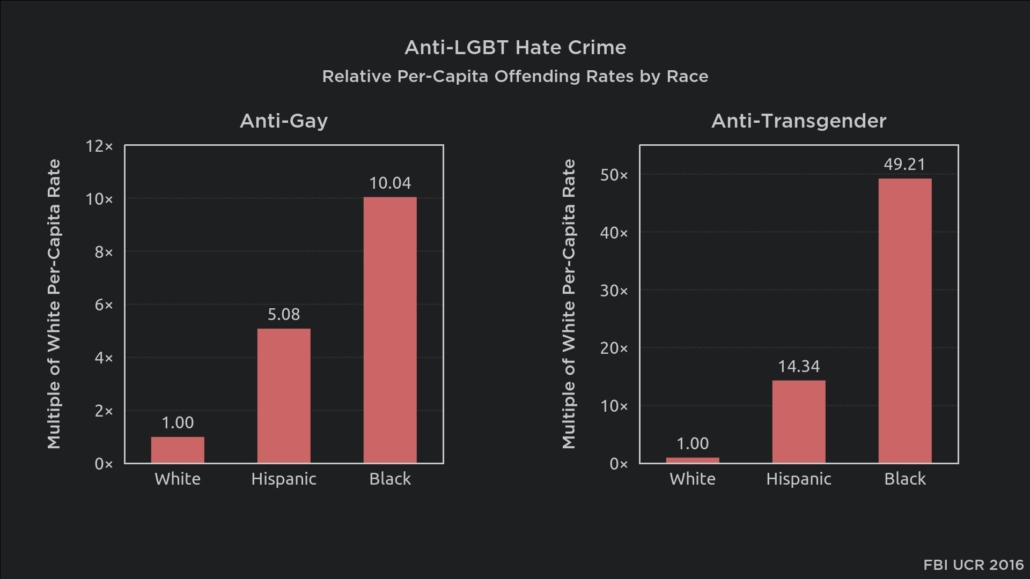Feeding the Dragon: The Left Want Power and Revenge, Not Equality and Justice
Mad to the Max
After several decades of this snake, spider and scorpion “uplift,” a conservative writer publishes a book called The Madness of Mandibles in which he ponders why snakes, spiders and scorpions are biting and stinging people more than ever, despite being given all they could ever have wished for. “They’ve been granted equality, so why aren’t they behaving like humans?” the conservative writer asks in bewilderment.

The Madness of Crowds by Douglas Murray
That’s a ridiculous scenario, of course. A conservative writer would never be so stupid. Or would he? I have my doubts, because I’ve based that scenario on a real conservative writer called Douglas Murray, who has just published a book called The Madness of Crowds that seems to be pretty much as stupid as The Madness of Mandibles. Murray’s book was reviewed by the part-Jewish political scientist Eric Kaufman in the Financial Times:
How did our societies become so insane? In The Madness of Crowds, Murray argues that it’s because highly educated people cling to a new religion known variously as “social justice”, “identity politics” or “intersectionality”. Essentially this is the old Marxist faith poured from the class bottle into the race-sex-gender one. Meaning is realised through struggle against those who commit wrongthink.As you can see, Kaufman’s review has the subtitle of “Slay the dragon, then stop.” That is Murray’s injunction to the practitioners of “identity politics.” Once they’d slain the dragon of injustice and oppression, they should have stopped their campaigning and become good little liberally democratic boys and girls (and trans-boys, trans-girls, gender-fluids, etc).
Identity politics helped reduce prejudice but, having vanquished its foe, began manufacturing phantom enemies. Murray, following the late conservative political theorist Kenneth Minogue, dubs this “St George in retirement” syndrome. Having slain the dragon, he charges off in pursuit of ever-smaller ones and ends by “swinging his sword at thin air, imagining it to contain dragons”. (The Madness of Crowds by Douglas Murray – Slay the dragon, then stop, The Financial Times, 11th October 2019)
No mistakes by the left
But was this ever a realistic expectation? No, it wasn’t. It’s deeply stupid to think that feminists, Black liberationists, LGBTQ+-rights campaigners et al would ever have “slain the dragon and stopped.” It’s also deeply misleading to summarize what went wrong in that way. The left were never pursuing equality and justice: they were always pursuing power and revenge. The left have never made any mistakes in their pursuit of power: it’s the right who have made all the mistakes. That’s why Murray’s injunction should gone like this: “Feed the dragon, then expect it to stop breathing fire.” Even conservatives could understand that this is stupid advice. Feeding dragons only encourages them. They won’t stop breathing fire, eating virgins and wreaking havoc. On the contrary: they’ll do all of those things more than ever.
No, George! You’re supposed to feed it, not spear it!
Similarly, non-Whites and other “oppressed” groups won’t stop attacking White society as they’re given more power and privilege within it. Millions of deluded American Whites voted for the narcissistic non-entity Barack Obama in the hope that his presidency would create a “post-racial” America where the noble dreams of the plagiarist and rape-enthusiast Martin Luther King would finally be realized. And what did those deluded Whites get in return for their votes? They got Black Lives Matter and an ever-increasing campaign of anti-White violence and vilification. And the violence against Whites highlights another stupidity in Douglas Murray’s — and Kenneth Minogue’s — arguments. The left aren’t suffering from “St George in retirement” syndrome and they aren’t “swinging” their swords “at thin air, imagining it to contain dragons.”
Beaten to death with hammers
No, they’re swinging their swords at real people who suffer real consequences. Just ask James Watson, Richard Lynne, Jason Richwine, Charles Murray, Noah Carl, and others on the ever-lengthening list of mostly White, mostly male bad-thinkers who have been punished with the loss of employment, income and reputation for making entirely reasonable and scientifically credible comments about the differing average abilities of Blacks and Whites or men and women. In many other cases, you can’t ask the victims about the real consequences of the left’s “sword-swinging,” because the victims are dead.
As Steve Sailer has pointed out, Black Lives Matter (BLM) has helped bring about thousands of extra murders by promoting the false idea that the American police are slaughtering “Black Bodies” on a horrific scale for despicably racist reasons. Sailer has also discussed other victims of BLM’s self-righteous and self-serving nonsense, like the White man in St. Louis who was beaten to death with hammers “by Youth of Color shouting ‘Kill the white people’ in a post-Ferguson wilding.”
The mainstream media don’t care about that kind of explicit anti-White violence, and they care even less about the implicit anti-White violence also discussed by Sailer:
A [Black] Houston armored car robber [called Redrick “Red” Batiste] invented a new wrinkle to speed things up: just immediately kill the messenger carrying the bag of money without asking him to put his hands up. … The total number of homicides in the US went up over 24% from 2014 to 2016. One theory is that policemen were discouraged by all the animosity directed against them. But another would be that the Great Awokening encouraged black criminals, like this fairly intelligent guy [Redrick Batiste], to be more homicidal [against Whites]. (Three Victims of the Great Awokening, The Unz Review, 20th September 2019)

When Blacks behave worse than Whites, leftists don’t care.
Leftism is based on lies and fantasies, which is why there is such a big gap between leftist ideology and leftist behaviour. Leftists claim to believe in equality, but in fact they have a hierarchy of superior and inferior groups. So they will ignore bad behaviour by superior groups, like Blacks, while inventing bad behaviour by inferior groups, like Whites. When superior groups are under-represented in some setting, this is irrefutable proof that White bigotry is holding them back. When superior groups are over-represented, on the other hand, leftists suddenly abandon their belief in equality.
Whites are sinners, non-Whites are saints
For example, women are over-represented at American universities, Blacks are over-represented in American government jobs, and there was not a single representative of the White British majority carrying the Olympic flag at the London Olympics in 2012. Do leftists care about this “inequality” and “injustice”? No, not in the slightest. When superior groups are over-represented, leftists abandon their principles of equality and justice.
This is because those principles were never sincere in the first place. Leftist demands for “equality” and “justice” are merely a tactic in the leftist pursuit of power. After all, leftists can hardly be explicit about their real aims: “We want to crush our political enemies and punish them for their sins against us.” Douglas Murray and other conservatives are extremely naïve to take leftist rhetoric at face value. And worse than naïve, because one of the most successful writers of all time exposed the true nature of leftism long ago.
In Animal Farm (1945), George Orwell satirized not only Soviet Communism but also its many supporters in the West. Orwell’s novella describes how the animals of Manor Farm overthrow their human oppressors in the name of the principle “All animals are equal.” But after the Revolution, the principle is overturned by the clever and cunning pigs, who represent the bureaucratic elite identified by the former Trotskyist James Burnham (1905-87) at the heart of modern leftism:
And finally there was a tremendous baying of dogs and a shrill crowing from the black cockerel, and out came Napoleon [the chief pig] himself, majestically upright, casting haughty glances from side to side, and with his dogs gambolling round him.That is a perfect summary of what leftists really believe: “All humans are equal, but some humans are more equal than others.” In other words, the leftist demand for equality and justice is not sincere. Identity politics was never intended to make Blacks equal to Whites or women equal to men or homosexuals equal to straights. No, it was intended to make Blacks, women and homosexuals superior to their alleged oppressors — or rather, to make the self-appointed representatives of those groups superior. Black Lives Matter claims to be campaigning for equality and justice, but it hasn’t benefited ordinary Blacks. Quite the contrary: it has sent thousands more of them to the graveyard.
He carried a whip in his trotter.
There was a deadly silence. Amazed, terrified, huddling together, the animals watched the long line of pigs march slowly round the yard. … Benjamin [the donkey] felt a nose nuzzling at his shoulder. He looked round. It was Clover [the horse]. Her old eyes looked dimmer than ever. Without saying anything, she tugged gently at his mane and led him round to the end of the big barn, where the Seven Commandments were written. For a minute or two they stood gazing at the tatted wall with its white lettering.
“My sight is failing,” she said finally. “Even when I was young I could not have read what was written there. But it appears to me that that wall looks different. Are the Seven Commandments the same as they used to be, Benjamin?”
For once Benjamin consented to break his rule, and he read out to her what was written on the wall. There was nothing there now except a single Commandment. It ran:
ALL ANIMALS ARE EQUAL
BUT SOME ANIMALS ARE MORE
EQUAL THAN OTHERS (Animal Farm, chapter X)
Better than Orwell
And the graveyard is also where Western Civilization is heading if leftists are allowed to have their way. By spreading mistaken ideas about leftism, Douglas Murray and other conservatives have actually become its allies. But this is exactly what you should expect of the political movement falsely known as “conservatism,” as was pointed out by Robert Lewis Dabney (1820-98), a theologian from the American South. Dabney is much less known than Orwell but was possibly even more insightful about politics and human psychology. It is astonishing to think that this anti-conservative polemic of his dates from 1871:
It may be inferred again that the present movement for women’s rights will certainly prevail from the history of its only opponent, Northern conservatism. This is a party which never conserves anything. Its history has been that it demurs to each aggression of the progressive party, and aims to save its credit by a respectable amount of growling, but always acquiesces at last in the innovation.Conservatives like Douglas Murray are behaving in exactly the same way well over a century later: constantly retreating before the forces they claim to oppose. They feed the dragon and expect it to stop breathing fire. Leftists and their favoured groups will never stop attacking Whites and their other alleged oppressors, because they do not want equality and justice. They want power over and revenge on those whom they hate. And if you don’t recognize the true malevolent nature of leftism, you have no hope of defeating it.
What was the resisted novelty of yesterday is today one of the accepted principles of conservatism; it is now conservative only in affecting to resist the next innovation, which will tomorrow be forced upon its timidity and will be succeeded by some third revolution; to be denounced and then adopted in its turn. American conservatism is merely the shadow that follows Radicalism as it moves forward towards perdition. It remains behind it, but never retards it, and always advances near its leader. This pretended salt bath utterly lost its savor: wherewith shall it be salted?
Its impotency is not hard, indeed, to explain. It is worthless because it is the conservatism of expediency only, and not of sturdy principle. It intends to risk nothing serious for the sake of the truth, and has no idea of being guilty of the folly of martyrdom. It always, when about to enter a protest, very blandly informs the wild beast whose path it essays to stop, that its “bark is worse than its bite,” and that it only means to save its manners by enacting its decent role of resistance. The only practical purpose which it now subserves in American politics is to give enough exercise to Radicalism to keep it “in wind,” and to prevent its becoming pursy and lazy from having nothing to whip.
No doubt, after a few years, when women’s suffrage shall have become an accomplished fact, conservatism will tacitly admit it into its creed, and thenceforward plume itself upon its wise firmness in opposing with similar weapons the extreme of baby suffrage; and when that too shall have been won, it will be heard declaring that the integrity of the American Constitution requires at least the refusal of suffrage to asses. There it will assume, with great dignity, its final position. – Robert Lewis Dabney, 1871 (As quoted by Vox Day in “Bowties on the historical battlefield,” Vox Popoli blog, 29th September 2019)




